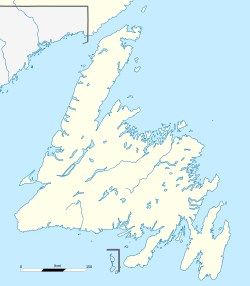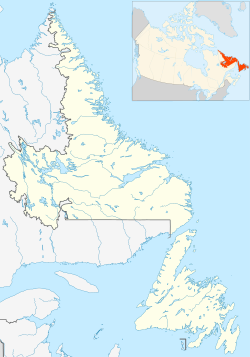Corner Brook
| Corner Brook | ||
|---|---|---|
| City | ||
| City of Corner Brook | ||

Overlooking City of Corner Brook
|
||
|
||
| Motto: "Our Spirit... Your Success" | ||
| Coordinates: 48°57′N 57°57′W / 48.950°N 57.950°W | ||
| Country |
|
|
| Province |
|
|
| Census division | 5 | |
| Settled | 1956 | |
| Government | ||
| • Type | Municipal | |
| • Mayor | Charles Pender | |
| • MHA |
Gerry Byrne (L) Eddie Joyce (L) |
|
| • MP | Gudie Hutchings (L) | |
| Area | ||
| • City | 148.26 km2 (57.24 sq mi) | |
| • Metro | 255.10 km2 (98.49 sq mi) | |
| Elevation | 0 - 304 m (0 – 998 ft) | |
| Population (2016) | ||
| • City | 19,806 | |
| • Metro density | 104.4/km2 (270/sq mi) | |
| Time zone | Newfoundland Time (UTC-3:30) | |
| • Summer (DST) | Newfoundland Daylight (UTC-2:30) | |
| Area code(s) | 709 | |
| Website | cornerbrook.com | |
Corner Brook (2011 population: 19,886 CA 26,623) is a city located on the west coast of the island of Newfoundland in Newfoundland and Labrador, Canada.
Located on the Bay of Islands at the mouth of the Humber River, the city is the largest population centre in the province after St. John's. As such, Corner Brook functions as a service centre for western and northern Newfoundland. It is located on the same latitude as Gaspé, Quebec, a city of similar size and landscape on the other side of the Gulf of St. Lawrence. Corner Brook is the most northern city in Atlantic Canada.
It is the administrative headquarters of the Qalipu Mi'kmaq First Nations band government. The Mi'kmaq name for the nearby Humber River is "Maqtukwek".
The area was surveyed by Captain James Cook in 1767. The Captain James Cook Historic Site stands on Crow Hill overlooking the city. By the middle of the 19th century the population of Corner Brook was less than 100, and the inhabitants were engaged in fishing and lumber work.
The area was originally four distinct communities, each with unique commercial activities: Curling, with its fishery; Corner Brook West (also known as Humber West or Westside) with its retail businesses; Corner Brook East (also known as Humbermouth and the Heights) with its railway and industrial operations; and Townsite (known as Corner Brook), home to the employees of the pulp and paper mill. In 1956, these four communities were amalgamated to form the present-day City of Corner Brook.
...
Wikipedia



